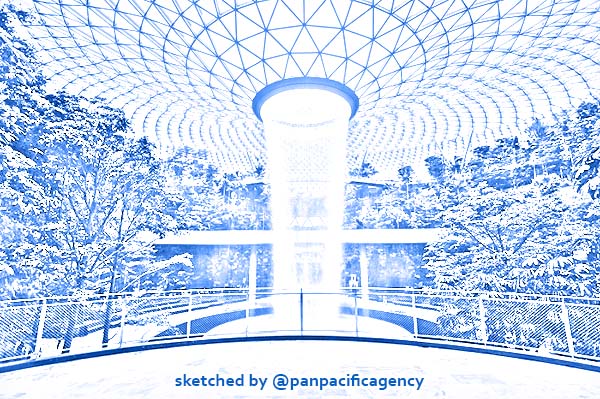All short-term visitors barred from entering or transiting in Singapore from Mar 23, 11.59pm

Waterfall in the Jewel Changi Airport, Singapure. Photo by: changiairport.com. Sketched by the Pan Pacific Agency.
SINGAPORE, Mar 22, 2020, The Straits Times. All short-term visitors will no longer be allowed to enter or transit through Singapore from 11.59pm on Monday (March 23) in view of the heightened risks of importing coronavirus cases into the country. Work pass holders and their dependants will be allowed to return to Singapore only if they work in sectors that provide essential services such as healthcare and transport, The Straits Times reported.
This will also kick in at 11.59pm on Monday, the Ministry of Health (MOH) said in a statement on Sunday.
The measures were announced a day after two patients – a 75-year-old Singaporean woman and a 64-year-old Indonesian man – died from Covid-19 due to complications. They were the first deaths the Republic has seen in the Covid-19 outbreak.
National Development Minister Lawrence Wong said at a briefing on Sunday morning that the measures to “significantly tighten” Singapore’s borders are taken in the light of the rapidly escalating virus outbreak around the world.
Previously, except for a handful of countries, short-term visitors from elsewhere were allowed to come into Singapore but were issued a 14-day stay-home notice (SHN) upon arrival.
This meant, however, that resources were being expended to serve and enforce SHNs on them, and if they fell ill, to provide them with medical treatment. On Saturday, there were still 533 short-term visitors arriving in Singapore.
To date, there are more than 260,000 Covid-19 cases across 185 countries, and around 11,200 deaths.
The MOH said that in Singapore, almost 80 per cent of new Covid-19 cases over the past three days were imported, most of them Singapore residents and long-term pass holders returning home from abroad.
These imported cases had travel histories to 22 different countries.
There were 432 cases of coronavirus patients in Singapore as of Saturday evening. A total of 140 cases have fully recovered. Of the 290 patients still in hospital, most are stable or improving, but 14 are in critical care.
On the limited entry for work pass holders and their dependants, the Manpower Ministry will allow this only for those in essential services.
On what constitutes essential services, Mr Wong said the Ministry of Manpower will continue to approve applications for the workers to come back according to existing rules, with inputs from relevant government agencies when needed.
He added that foreign domestic helpers could also be considered as offering essential services, especially in cases where they are needed to help look after children or the elderly.
As previously announced, all Singapore citizens, permanent residents and long-term pass holders returning will continue to be issued a 14-day SHN.
In addition, Malaysians with Singapore work permits can continue to work in the Republic during this period, with accommodation arrangements.
Transport of goods between both countries will also be facilitated, the Singapore-Malaysia Special Working Committee has agreed.
Diplomats accredited and based in Singapore can continue to come in. They will also be subjected to the 14-day isolation.
On Sunday, Mr Wong said that these were very significant moves especially for a small open economy like Singapore which has always been connected to the world.
“But this is an unprecedented crisis,” he said.
He noted that while very few short-term visitors have been diagnosed with the coronavirus, they can take up enforcement and medical resources.
“During this time, we have to focus our resources on returning Singaporeans,” he said.
On how long these measure will remain in place, he said: “I can’t say at this stage. No one will know how long this current wave of imported cases we are experiencing will last for.”
He added: “It depends on how long the outbreak is going to continue in Europe and America, which are now the new epicentres for the virus outbreak. It (also) depends on how long more we will see returning Singaporeans coming back, so we will monitor on a day by day basis.”
Mr Wong also warned that the Government is considering measures against those who choose to travel overseas despite the border control measures.
“I don’t think we can allow this to continue. We are discussing what additional measures may be needed,” he said, adding that work pass holders who leave Singapore at this time may face the consequence of not being allowed entry later.
In recent days, most of the new patients in Singapore have been imported cases, that is, returning residents and long-term pass holders with travel history to Europe, North America, South-east Asia and other parts of Asia.
Besides strict border controls, rigorous contact tracing, quarantine and home isolation, the Government has implemented safe distancing measures such as smaller crowd sizes and keeping safe spaces around individuals, especially vulnerable segments of the population like the elderly.
For example, all events and gatherings with 250 or more participants are to be suspended until June 30, while the suspension of all social activities for seniors by government agencies will be extended for another two weeks until April 7.
In a Facebook post after the two deaths were announced on Saturday, Prime Minister Lee Hsien Loong sent his deepest condolences to the patients’ loved ones. He said Singapore must brace itself for more losses even as healthcare workers do their best to care for patients.
He also urged everyone to work together with the Government in its efforts to slow the spread of the virus.